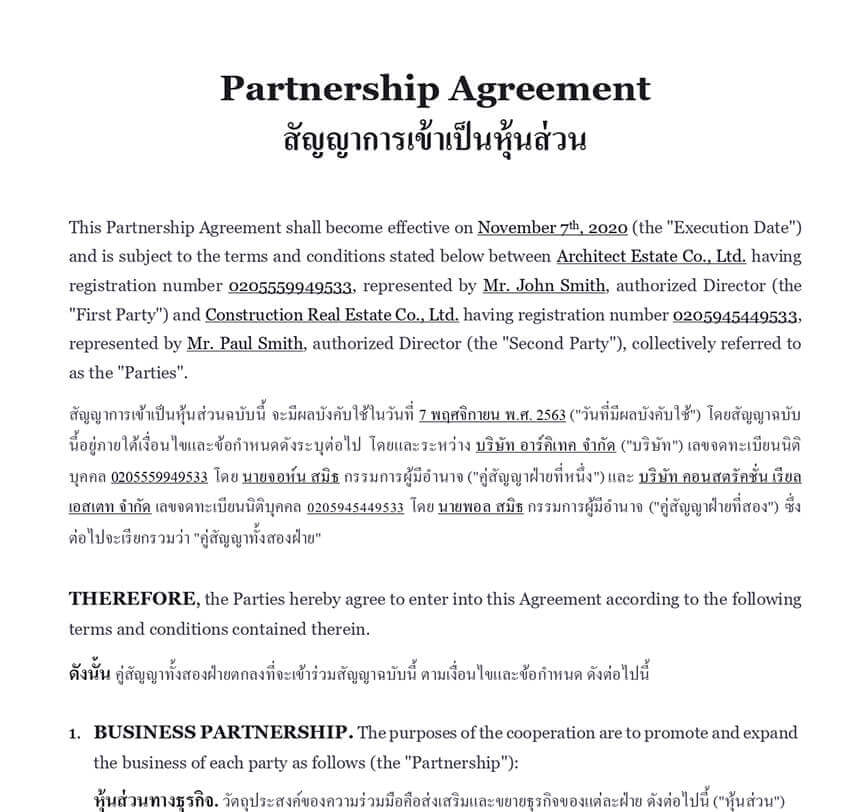If you do not wish to call upon a professional to assist you in the drafting of your business partnership agreement, as already mentioned, these agreements are subject to a high degree of liberalism, which means that you can, at your own risk, dispense with the advice of a professional. Regardless of your sector of activity or the form of your company, you can therefore contract with any other professional.
However, in order to guarantee a certain quality and security in the execution of the business partnership agreement, here are the various indispensable clauses and documents attached to a good agreement even though no law provides for any formalism:
1. An annexed document must imperatively specify in the most detailed way possible the identity of the parties, an affidavit of the company must also be annexed as well as the identity card of the director(s) signing the agreement,
2. The subject matter, which is a mandatory element within the contract to identify the scope of the business partnership agreement and its application in this case,
3. The price, which is one of the essential elements of any business contracts, for more precision and therefore security, the mention in figures and letters is strongly advised. The clause can also stipulate the terms of payment, for example that it must be made no later than seven days after the customer has paid the other party,
4. A confidentiality clause is necessary to protect your business partnership since a lot of information will be exchanged. A very particular attention must thus be attached to this clause. You must take care to define its content and its duration: it is advisable to draw up a list, preferably non-exhaustive, which presents what the clause concerns. This could be software and data, corporate strategy, inventions, financial information or information about suppliers. As for the temporality, you can limit the confidentiality in time by mentioning a defined period,
5. A clause relating to the duration of the established business relationship, two possible cases: either you envisage that the relationship will end at the end of a certain time, expressly defined, it is then a question of a contract for a fixed period; or that the relationship is said to be for an indefinite period. In the first case, it is possible to provide for tacit renewal, for example. In the second case, as it is always possible to terminate a contractual relationship, it is advisable to envisage the terms of a termination: prior notice of default for example,
6. An independent termination clause, this type of clause can be interesting when you contract for the first time with a professional and therefore you have no knowledge of his way of working. In the event that you are not satisfied with the business partnership agreement reached, this clause allows you to terminate the contractual relationship without having to take the matter to court,
7. A clause relating to the competent jurisdiction and one relating to the law applicable to the contract, or even an arbitration clause, in the interests of speeding up the resolution of a possible dispute, these clauses make it possible to determine in advance which jurisdiction will be seized and which law will govern the dispute:
The first is called the “choice of court clause“. A 2005 Hague International Convention on Choice of Court Agreements governs the regime for this clause. As for the parties to the International Convention, the European Union (except Denmark), Mexico and Singapore have ratified it. The latter is used in view of concerns related to the costs and the execution of a dispute. Often the professional will designate in this clause the jurisdiction of the place of his registered office.
The second is the law designated by the parties to resolve their dispute. The parties are generally free in this designation, however, the judge may set it aside if it conflicts with a public policy law or public order,
Finally, the arbitration clause is the clause that designates the method of dispute resolution that is arbitration. The arbitral board makes an arbitral award, so it is not a state court that decides the dispute. This clause has advantages and disadvantages. The advantages: the rapidity of the procedure contrary to the time limit provided for the state courts. But also, the confidentiality since the arbitral award is not subject to publicity because it is not rendered in the name of the State thus this one is not the subject of publication consultable by all. One of the disadvantages lies in the cost of this privatized justice. Indeed, the arbitrators being experienced experts, their remuneration is often high. This clause must also be drafted with the greatest care since it has a particular regime. Positive law recognizes its autonomy in relation to the contract, which means that if the contract is annulled or becomes null and void, the arbitration clause is no less affected, as long as it is also valid. And these validity criteria are relatively flexible; it is sufficient, for example, for the clause simply to include the word “arbitration” and it will be considered as such. Here again, it is advisable to consult a lawyer to obtain a good quality clause.
As you can see, the clauses cover the entire process, from the conclusion of the business partnership agreement, through its execution, and then its duration, and even the modalities for the resolution of a possible dispute are considered.
Moreover, if you are led to contract with a professional who proposes standard contracts, it is necessary to include the date and the signature of the legal representative of the company on the contract. This will attest to the fact that he/she has read all the clauses in the contract and has made any comments at the same time.
It is important for a good execution of the business partnership agreement to draft a general part before the various clauses mentioned above to establish the general rules and principles that define the way in which the contract should be executed.
In order to illustrate this, here are some examples: promotion to customers must be carried out in a professional manner. Above all, it is necessary to guarantee the reputation of the contracting party. The content of the information provided must be subject to the approval of the contractual partner before it is disclosed.
The principle of good faith can also be illustrated through clauses relating to non-competition, non-solicitation of clients and employers of the other party. And this in order to preserve a good understanding throughout the execution of the business partnership contract, since, as a reminder, this agreement can be of a perennial nature, either because the number of years is stipulated, or in an indeterminate manner.
Moreover, like any contract, the obligations must be performed in good faith. If one of the parties fails to perform its obligations or performs them badly, it could be held liable under Singaporean law. This means that, in addition to being obliged to fulfill its commitment, it could be ordered to pay financial compensation in the form of damages.












